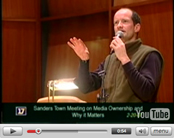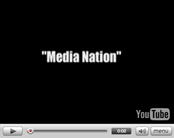FILM REVIEW: The Dark Knight - The Joke Is On U.S.
The Dark Knight: The Joke Is On U.S.
by Rob Williams, ACME Co-President
The day I went to see director Christopher Nolan’s edgy new film “The Dark Knight,” I received an e-mailed article from my colleague Peter Phillips at California’s Sonoma State University. Phillips, a sociology and journalism professor, annually publishes a book called Project Censored, a collection of significant ongoing news stories underreported or ignored in the U.S. mainstream press. His article cited a January 2008 Opinion Research Business report that indicated that approximately 1 million Iraqi citizens – one million – have been killed since the U.S. invasion and occupation – with 1/3 of those deaths being caused by U.S. air attacks on Iraqi neighborhoods, and fully ½ of those deaths “attributable to U.S. forces.”
I bring this up because, in an era where so much of our mainstream news is censored by a number of filters, sometimes popular culture – take Hollywood, for example – can shine a light in dark places, bringing us illumination, and, perhaps, a bit of wisdom.
Now I know what you are thinking. Dude, it’s summer. Lighten up. Go with the flow. But I know, as anyone who has seen his masterful 2000 sleeper “Memento” knows, that Christopher Nolan is a smart film director, and he does things for a reason.
“The Dark Knight,” as any comic book or film buff knows, is a morality play about the complicated nature of good and evil, and the tension between the two. It is a film that endorses vigilante justice, electronic eavesdropping, and other extra-legal activities (which seem, these days, to be acceptable tropes in post 9/11 pop culture – a sign of the times, perhaps) and stars a gigantic cast, including Christian Bale as the conflicted billionaire-by-day/vigilante-by-night himself, Gary Oldman as James Gordon, Maggie Gyllenhaal as Rachel Dawes, and of course, Morgan Freeman’s Lucius Fox and Michael Caine’s Alfred the Butler in supporting roles. Nolan also introduces two charismatic new characters into the mix – Aaron “Thank You For Smoking” Eckhart as Gotham City D.A. Harvey Dent, and the late Heath Ledger as the Joker.
My old friend Sara Voorhees, a nationally syndicated film critic, called Nolan’s new film “near perfect” in a review last week. I’d concur - there is much to like about this film, easily the best action movie of the summer thus far: larger-than-life Gotham grandiosity; heart-stopping and dizzying action sequences; gadgets, gizmos and smash-‘em-up street chases galore; and camera work that continually spins around the characters regardless of where they happen to be – a Nolan-esque signature trademark, as familiar to sharp-eyed viewers as Michael Mann’s use of rack focusing or Scorcese’s gratuitous blood. Heck, there’s even a very small cameo by Vermont Senator Patrick Leahy – a longtime Batman fan (you can watch the clip on YouTube – seriously).
But it is the characters in Nolan’s film that compel – unusual for a summer action film, I know. Bale’s Batman (or “The Batman,” as he is continually called in this film) is as tightly wound as ever, caught between his desire to do the right thing as a force for good working outside the law, and his hope of living the normal humdrum life of a Lamborghini-driving billionaire. Eckhart’s aptly-named Dent emerges as the hero of the story – until things take an unlikely turn and he emerges as “Two Face” (and he does, indeed, have two – go see the film to see what I mean).
And yes, the advance buzz about Heath Ledger’s “The Joker” is right on the money. I grew up watching Cesar Romero play “The Joker” on television, and thought Jack Nicholson’s rendition in Tim Burton’s 1989 version not bad. Ledger dominates the film, though, in a mesmerizing portrayal of anarchy incarnate, chaos in a clown face.
And “The Joker” – repeatedly referred to as a “terrorist” - is a character for our times, embodying the collective corruption of a civilization in decline, and able to network and feed off human vice and weakness. Whether it is greedy mobsters, frail civilians, or malleable public servants, Ledger’s Joker, the most psychologically sophisticated villain since Anthony Hopkins’ Hannibal Lecter, uses all of them in equal measure. His motives are inscrutable, beyond a desire to cause calamity. And this may be Nolan’s point: in a world where there are no clear-cut heroes (which is to say - the real world), evil manifests itself in often-unpredictable ways, and we all have roles to play in the outcome.
And, in one neat “prisoner’s dilemma” sequence towards the end of the film (involving two ferries of Gotham residents), the Joker (and Nolan) remind us that no one is innocent, and that we all have choices to make. What lessons you might draw from Nolan’s film for our own time, as citizens of the richest and most powerful government on the planet fighting the “evil terrorists,” I leave up to you – suffice to say, I left the theater with more to think about than I anticipated.
So here’s to a summer action blockbuster with brains - maybe the best film of the summer.



![View your cart items []](/sites/default/modules/ecommerce/cart/images/cart_empty.png)




